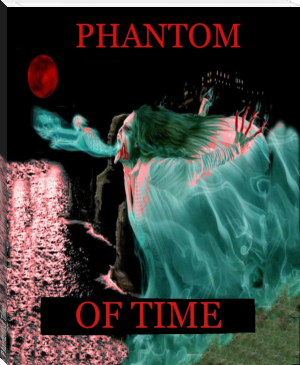The Truth about Angels - Ellen G. White (i like reading .TXT) 📗

- Author: Ellen G. White
Book online «The Truth about Angels - Ellen G. White (i like reading .TXT) 📗». Author Ellen G. White
Heavenly agencies have to contend with hindrances before the purpose of God is fulfilled in its time. The king of Persia was controlled by the highest of all evil angels. He refused, as did Pharaoh, to obey the word of the Lord. Gabriel declared, He [Satan] withstood me twenty-one days by his representations against the Jews. But Michael came to his help, and then he remained with the kings of Persia, holding the powers in check, giving right counsel against evil counsel.—The S.D.A. Bible Commentary 4:1173. {TA 144.1}
[Cyrus] the [Persian] monarch had resisted the impressions of the Spirit of God during the three weeks while Daniel was fasting and praying, but Heaven’s Prince, the archangel, Michael, was sent to turn the heart of the stubborn king to take some decided action to answer the prayer of Daniel.—The Review and Herald, February 8, 1881. {TA 144.2}
No less a personage than the Son of God appeared to Daniel. This description is similar to that given by John when Christ was revealed to him upon the Isle of Patmos. {TA 144.3}
Our Lord now comes with another heavenly messenger to teach Daniel what would take place in the latter days.—The Review and Herald, February 8, 1881. {TA 144.4}
Daniel ... could not look upon the angel’s face, and he had no strength; it was all gone. So the angel came to him and set him upon his knees. He could not behold him then. And then the angel came to him with the appearance of a man. Then he could bear the sight.—Manuscript Releases 2:348. {TA 144.5}
The victory was finally gained, and the forces of the enemy were held in check all the days of Cyrus, who reigned for seven years, and all the days of his son Cambyses, who reigned about seven years and a half.—The Review and Herald, December 5, 1907. {TA 145.1}
The Second Temple
The second temple did not equal the first in magnificence, nor was it hallowed by those visible tokens of the divine presence which pertained to the first temple. There was no manifestation of supernatural power to mark its dedication. No cloud of glory was seen to fill the newly erected sanctuary. No fire from heaven descended to consume the sacrifice upon its altar. The Shekinah no longer abode between the cherubim in the most holy place; the ark, the mercy seat, and the tables of testimony were not found there. No sign from heaven made known to the inquiring priest the will of Jehovah.—Prophets and Kings, 596, 597. {TA 145.2}
Ezra
The children of the captivity who had returned with Ezra “offered burnt offerings unto the God of Israel” for a sin offering and as a token of their gratitude and thanksgiving for the protection of holy angels during the journey.—Prophets and Kings, 619. {TA 145.3}
Nehemiah
Four months Nehemiah waited for a favorable opportunity to present his request to the king. During this time, though his heart was heavy with grief, he endeavored to bear himself with cheerfulness in the royal presence. In those halls of luxury and splendor, all must appear lighthearted and happy. Distress must not cast its shadow over the countenance of any attendant of royalty. But in Nehemiah’s seasons of retirement, concealed from human sight, many were the prayers, the confessions, the tears, heard and witnessed by God and angels.—Prophets and Kings, 630. {TA 146.1}
The Visions of Zechariah
“I lifted up mine eyes again,” says Zechariah, “and looked, and behold a man with a measuring line in his hand. Then said I, Whither goest thou? And he said unto me, To measure Jerusalem, to see what is the breadth thereof, and what is the length thereof. And, behold, the angel that talked with me went forth, and another angel went out to meet him, and said unto him, Run, speak to this young man, saying, Jerusalem shall be inhabited as towns without walls for the multitude of men and cattle therein: for I, saith the Lord, will be unto her a wall of fire round about, and will be the glory in the midst of her.”—The Review and Herald, December 26, 1907. {TA 146.2}
The Vision of Joshua and the Angel
The scene of Satan’s accusation was presented before the prophet. He says, “He showed me Joshua the high priest standing before the angel of the Lord, and Satan standing at his right hand to resist him.”—The Review and Herald, August 22, 1893. {TA 146.3}
A most forcible and impressive illustration of the work of Satan and the work of Christ, and the power of our Mediator to vanquish the accuser of His people, is given in the prophecy of Zechariah. In holy vision the prophet beholds Joshua the high priest, “clothed with filthy garments,” standing before the Angel of the Lord, entreating the mercy of God in behalf of His people who are in deep affliction. Satan stands at his right hand to resist him. {TA 147.1}
Because Israel had been chosen to preserve the knowledge of God in the earth, they had been, from their first existence as a nation, the special objects of Satan’s enmity, and he had determined to cause their destruction. He could do them no harm while they were obedient to God; therefore he had bent all his power and cunning to entice them into sin. Ensnared by his temptations they had transgressed the law of God and thus separated from the Source of their strength, and had been left to become the prey of their heathen enemies. They were carried into captivity to Babylon, and there remained for many years. {TA 147.2}
Yet they were not forsaken of the Lord. His prophets were sent to them with reproofs and warnings. The people were awakened to see their guilt, they humbled themselves before God, and returned to Him with true repentance. Then the Lord sent them messages of encouragement, declaring that He would deliver them from their captivity and restore them to His favor. It was this that Satan was determined to prevent. A remnant of Israel had already returned to their own land, and Satan was seeking to move upon the heathen nations, who were his agents, to utterly destroy them.... {TA 147.3}
The high priest [Joshua] cannot defend himself or his people from Satan’s accusations. He does not claim that Israel are free from fault. In his filthy garments, symbolizing the sins of the people, which he bears as their representative, he stands before the Angel, confessing their guilt, yet pointing to their repentance and humiliation, relying upon the mercy of a sin-pardoning Redeemer and in faith claiming the promises of God. {TA 148.1}
Then the Angel, who is Christ Himself, the Saviour of sinners, puts to silence the accuser of His people, declaring: “The Lord rebuke thee, O Satan; even the Lord that hath chosen Jerusalem rebuke thee: is not this a brand plucked out of the fire?” Israel had long remained in the furnace of affliction. Because of their sins they had been well-nigh consumed in the flame kindled by Satan and his agents for their destruction, but God had now set His hand to bring them forth. In their penitence and humiliation the compassionate Saviour will not leave His people to the cruel power of the heathen.... {TA 148.2}
As the intercession of Joshua is accepted, the command is given, “Take away the filthy garments from him,” and to Joshua the Angel declares, “Behold, I have caused thine iniquity to pass from thee, and I will clothe thee with change of raiment.” “So they set a fair miter upon his head, and clothed him with garments.” His own sins and those of his people were pardoned. Israel were clothed with “change of raiment”—the righteousness of Christ imputed to them. The miter placed upon Joshua’s head was such as was worn by the priests and bore the inscription, “Holiness to the Lord,” signifying that, notwithstanding his former transgressions, he was now qualified to minister before God in His sanctuary. {TA 148.3}
After thus solemnly investing him with the dignity of the priesthood the Angel declared: “Thus saith the Lord of hosts; If thou wilt walk in My ways, and if thou wilt keep My charge, then thou shalt also judge My house, and shalt also keep My courts, and I will give thee places to walk among these that stand by.” He would be honored as the judge or ruler over the temple and all its services; he should walk among attending angels, even in this life, and should at last join the glorified throng around the throne of God.—Testimonies for the Church 5:467-469. {TA 149.1}
This word of assurance is given to all who have faith in God. Receive this wonderful promise. It is not a human being who is speaking. “Thus saith the Lord of hosts: If thou wilt walk in my ways, and if thou wilt keep my charge, then thou shalt also judge my house, and shalt also keep my courts and I will give thee places to walk among these that stand by.” {TA 149.2}
“Among these that stand by.” The hosts of the enemy, who are trying to bring God’s people into disrepute, and the hosts of heaven, ten thousand times ten thousand angels, who watch over and guard the tempted people of God, uplifting them and strengthening them—these are they who stand by. And God says to His believing ones, You shall walk among them. You shall not be overcome by the powers of darkness. You shall stand before me in the sight of the holy angels, who are sent forth to minister to those who shall be heirs of salvation.—The Review and Herald, April 30, 1901. {TA 149.3}
The Vision of the Seven Lamps and the Two Olive Trees
Immediately after Zechariah’s vision of Joshua and the angel, given to the high priest as a personal testimony for his own encouragement and the encouragement of all the people of God, the prophet received a personal testimony regarding the work of Zerubbabel. “The angel that talked with me,” Zechariah declares, “came again, and waked me, as a man that is waked out of his sleep, and said unto me, What seest thou? And I said, I have looked, and behold a candlestick all of gold, with a bowl upon the top of it, and his seven lamps thereon, and seven pipes to the seven lamps, which are upon the top thereof: and two olive trees by it, one upon the right side of the bowl, and the other upon the left side thereof.”—The Review and Herald, January 16, 1908. {TA 150.1}
“Then answered I, and said unto him, What are these two olive-trees upon the right side of the candlestick and upon the left side thereof? And I answered again, and said unto him, what be these two olive-branches which through the two golden pipes empty the golden oil out of themselves? and he answered me and said, “.... These are the two anointed ones, that stand by the Lord of the whole earth.” {TA 150.2}
The anointed ones standing by the Lord of the whole earth have the position once given to Satan as covering cherub. By the holy beings surrounding His throne, the Lord keeps up a constant communication with the inhabitants of the earth.—The Review and Herald, July 20, 1897. {TA 150.3}
Angels in the Time of Esther
The king’s [Ahasuerus’] decision against the Jews was secured under false pretenses through misrepresentation of that peculiar people. Satan instigated the scheme in order to rid the earth of those who preserved the knowledge of the true God. But his plots were defeated by a counterpower that reigns among the children of men. Angels that excel in strength were commissioned to protect the people of God, and the plots of their adversaries returned upon their own heads.—Testimonies for the Church 5:450. {TA 151.1}
On the day appointed for their destruction, “the Jews gathered themselves together in their cities throughout all the provinces of the king Ahasuerus, to lay hand on such as sought their hurt: and no man could withstand them; for the fear of them fell upon all people.” Angels that excel in strength had been commissioned by God to protect His people while they





Comments (0)